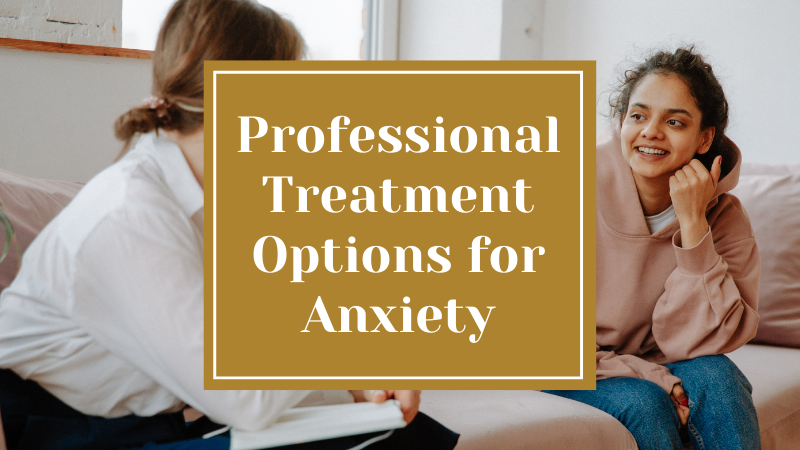Clinical Psychologist
The clinical psychologist typically conducts psychological testing, but may also engage in counseling or therapy (for our purposes these terms can be used interchangeably). It is common for children who suffering from anxiety or other mental illnesses to be referred to psychologists for testing in order to determine eligibility for educational accommodations.
Psychiatrist
A psychiatrist is a medical doctor with advanced training in mental health issues. Usually, only a psychiatrist can prescribe medications. In some states an Advanced Psychiatric Registered Nurse (APRN) can also prescribe medications.
An APRN is basically a nurse with the advanced training of a psychiatrist. For many people who suffer with anxiety, the best treatment is a combination of medications and counseling. Psychiatrists usually provide little or no counseling, but focus on medications.
Licensed Professional Counselor (LPC)
The LPC is known by a variety of names depending on the state in which you reside. Licensed Professional Counselor (LPC) or Licensed Mental Health Counselor (LMHC) are the most common titles.
These are generalist counselors who are generally broadly focused in terms of the types of clients they serve and problems that they deal with. However, the LPC often has a specialization (children, anxiety, depression, etc…). These professionals provide general counseling services.
It is important to note that Medicare will not pay for the services of LPCs in most states (although Medicaid will).
Licensed Marriage and Family Therapist (LMFT)
The LMFT focuses on marriage and family issues. The LMFT certainly can help people who are struggling with anxiety, but they will probably focus on family issues, and the ways in which a person’s relationships affect their symptoms.
Licensed Clinical Social Worker (LCSW)
Social workers engage in a variety of work and professions, but they often engage in general counseling. The LCSW would provide similar services (in terms of therapy) as the LPC or LMFT, but for older adults, the LCSW is generally able to accept payment from Medicare.
What is Treatment for Anxiety Like?
Many people find entering treatment for anxiety to be a daunting, embarrassing, or unacceptable practice. However, most people who actively engage in treatment find it to be helpful and a positive experience.
The embarrassment and shame associated with entering treatment is often related to the social stigma we have surrounding mental illness. We feel that if we are seen going into a counseling center or psychiatrist’s office, we will be seen as being “crazy.” Of course this is changing and attitudes toward treatment vary across cultures and even geographic locations in the country.
On your first visit to a counselor or psychiatrist, you are likely going to have to fill out some paperwork. You will then meet with the professional who will probably conduct a fairly detailed interview to determine what the problem is, and to determine what type of treatment technique would be most helpful.
After the first visit, people are usually more comfortable with the treatment for anxiety. If a person continues to feel uncomfortable, or uneasy, they may want to request or seek out a different professional—sometimes personalities just don’t match up.
Don’t be afraid to leave one professional for another one that you feel more comfortable with. If you don’t feel comfortable with your provider, then you won’t be able to open up as honestly and it may hurt the outcome of your treatment.
There are a variety of common treatment techniques, and I would like to briefly describe some of them here:
1. Medication
Sometimes medication is necessary when it comes to your treatment for anxiety. The specifics of medications should be discussed with a medical doctor, but anxiety is typically treated with common SSRIs (Prozac, Zoloft, etc…) or in more extreme cases benzodiazepines (Clonazepam, Lorazepam, etc…).
The benzodiazepines are addictive and lose effectiveness over time, and therefore are usually prescribed only to stabilize anxiety or as medications to be taken as needed when anxiety or panic surfaces.
Although your family doctor is able to prescribe psychiatric medications, it is usually advisable to seek out a psychiatrist to obtain medications because many family doctors are not comfortable giving psychiatric medications and therefore often give very low doses causes patients to complain that: “I’ve tried ___________, it never really did anything.”
This is not to say that consulting with a family doctor before visiting a psychiatrist is not a good idea. Most of the time it is a good idea to rule out medical conditions that could be causing symptoms.
Finally, keep in mind that many medications take several weeks to begin working, and some take up to eight weeks. Some people get impatient and decide that the medication isn’t working, but often they have not given it enough time.
Also, note that family and friends will often notice a difference in your anxiety level before you do. What seems normal to us, might seem “odd” to family members and therefore, we find that others notice small improvements before we do.
2. Cognitive Behavior Therapy (CBT)
Probably the most common form of therapy is CBT. In this therapy, the counselor will work to help the client to discover the underlying thoughts, beliefs, and self-talk that are often the root of anxiety.
We often hear negative messages in our childhood and throughout our life from significant others. We might internalize these messages, and we then have thoughts that create anxiety without even realizing it. See last week’s post for a detailed example of how this works.
Once the client and the counselor have discovered the thoughts and beliefs which lead to anxiety, they then can work on challenging and changing those thoughts and beliefs. As we begin to see the events that trigger anxiety-provoking thoughts from a different point of view we eventually gain more control over our anxiety and the unwanted thoughts that provoke it.
3. Acceptance and Commitment Therapy (ACT) and Mindfulness
ACT (pronounced “act”) and mindfulness are relatively forms of therapy that involve focusing on the present moment. The therapist helps the client to develop acceptance of thoughts and feelings as just thoughts and feelings.
We can accept these thoughts and feelings without acting on them. The therapist helps us to look from the outside at our problems and thereby view them as thing that are happening to us rather than as things that happen in us.
4. Exposure Therapy
Another approach to counseling is exposure therapy. In this technique, the therapist challenges the client to gradually expose themselves to situations that cause or create anxiety. This is often done through the use of imagery (imagining an anxiety-provoking situation).
Exposure therapy might also involve gradually facing an anxiety-provoking situation in real life, but little by little.
For example, if a person experiences anxiety when they are around crowds, they might go through a series of steps to desensitize themselves to the situation. It might be as simple as going to grocery store by one’s self at a time when there are few customers. Then the person might be asked to go to the store when it is a little busier.
The steps would continue, and the person would gradually become aware of their anxiety, and learn to utilize effective coping skills to prevent it from interfering with their daily life.
5. Coping Skills Education
When faced with anxiety, a counselor can help us find the coping skills that will work the best for us. Although we discussed several of the most common coping skills for anxiety in last week’s post, there are many things that people can do that would be considered coping skills.
Some of these skills might be tailored to the individual’s particular anxiety-provoking events, others might be focused on the individual’s personality or other individual factors.
A spiritual person might carry some kind of religious item to help them feel a sense of “divine” protection or strength.
A person who experiences a lot of tension or shortness of breath, might be encouraged to focus on deep breathing and muscle relaxation exercises.
A person who is anxious when alone might be challenged to identify hobbies or projects that they can engage in that will keep their mind off of their anxiety.
In Closing
What we discussed above was just a brief overview of what professionals can do in regard to your treatment for anxiety. A good therapist will help a person to identify, confront, and eventually to overcome the root causes of anxiety, but in general the focus is initially on alleviating symptoms, so that the real problem can be addressed.
So, if you think you might be struggling with significant anxiety, please seek help from a professional. If money or insurance is an issue, look for a professional who works on a “sliding scale fee” (this usually occurs within an agency or counseling center).
The bottom line is this: your anxiety will not get better unless you do something about.
Let’s do a quick experiment. Close your eyes, and imagine that you have gone through a treatment program and completed counseling. Imagine that you are taking medications that keep your anxiety under control, and then imagine what would be different about your life (reflect on this for a few minutes before reading on).
Okay, you’re back!
So, if you did the experiment above you probably notice that you feel just a little better. You didn’t really do anything, but you still feel better!
What happened?
You took some control—if only in your imagination, and if only for a second.
Anxiety is all about feeling a lack of control, and by giving yourself that control (even for a second) your anxiety level goes down. Imagine how much it would go down just by calling and checking out treatment options in your area.



